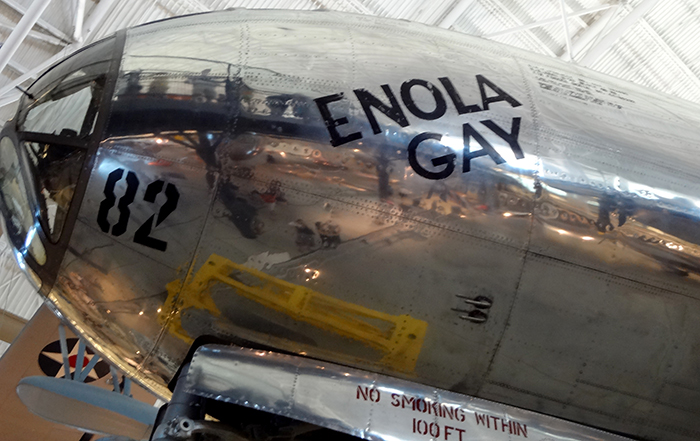Paul Williams: How did you come to be posted on Tinian? What were you doing when the war broke out?
Harry Andritsis: Well, let’s see. They shipped me to Wendover, Utah. I had my secret training there but I didn’t know what it was about or anything until I got to Tinian.
Williams: When you say secret training, how did that work? Did you just know that you were working with a different kind of bomber—I mean, a bomber that was modified?
Andritsis: In Utah everything was hush-hush. There was never any talk about anything you saw or heard on the base. There was no conversation of any kind. And then in August I was shipped out of there [Wendover].
Williams: When you were shipped out to Tinian, did you know what to expect? Did you have any idea about what the island was like?
Andritsis: No, I had no idea where I was going. I flew over there with Colonel Tibbets.
Williams: How long did you spent out there?
Andritsis: I think maybe a couple of months—maybe a bit less.
Williams: So what were your impressions of the Island when you arrived?
Andritsis: It was nice. It was very cool.
Williams: So you were never aware of the mission of the Enola Gay before it happened, is that correct?
Andritsis: Correct.
Williams: As a mechanic, when you were working on the engine of the Enola Gay—was it just the Enola Gay, or was it other planes like it?
Andritsis: Oh no, it was the same for the Enola Gay. At that point I was crew chief on the ground.
Williams: And did it seem like it was an unusual plane in any way, or did it seem like the other bombers that you had seen?
Andritsis: Well this was a special type of a plane modified in many different ways.
Williams: So did you think it was odd the modifications—did you think it must have an unusual mission?
Andritsis: Well we did, but we were told to not ask questions. No conversation of anything that was going to take place on Tinian.
Williams: Were you surprised when you heard the news about the first bomb being dropped on Hiroshima? Was Tibbett’s able to tell you at the base what he had done?
Andritsis: No, he didn’t. When he came back [he could]. Yeah, we learned that they had blown up the thing.
Williams: So you hadn’t heard of the atomic bomb before he left?
Andritsis: No, but I assumed they were getting them ready.
Williams: So did you understand at the time that this was a new kind of bomb, potentially far more devastating than others?
Andritsis: I knew that it was a suicide mission—it could have exploded anytime, anywhere, any second. We were on strict orders that we could’ve been wiped out, at the slightest mistake.
Williams: So your job then as the engine mechanic was especially important in this situation that nothing went wrong with the plane?
Andritsis: Exactly. It had to be perfect conditions or it could never leave the field.
Williams: There was some concern about the plane taking off and about the runway being long enough?
Andritsis: Oh I can’t remember now thoroughly, it’s been a long time, but the mission was complete. Everything was successful.
Williams: Did you get along with Colonel Tibbets?
Andritsis: Tibbets was an officer and the enlisted men kept to the enlisted men. But we got along because he was a great man, and I was very happy that I’d been assigned to the Enola Gay.
Williams: Once the Enola Gay came back after the mission was successful, was that the end of that particular job for you?
Andritsis: Well, there was another mission after that.
Williams: Did you work on the Nagasaki mission as well?
Andritsis: Well everything was on the same base, but it was a different crew chief and a different plane. But as soon as the Enola came back, we were told that we were going home.
Williams: Did you return to a civilian role after the war?
Andritsis: Yeah, I was discharged in Roswell, New Mexico and I went back to become a civilian. They wanted me to stay in and make me a master sergeant.
Williams: Any lasting stories to share?
Andritsis: We just wanted to get in there, get it over, and go home. It was a great mission, a good end to a good war. It would’ve taken a lot of Americans to take Japan. It was either them or us. Was it a good thing? Well, if we didn’t do it, we wouldn’t be here to talk about it now.




